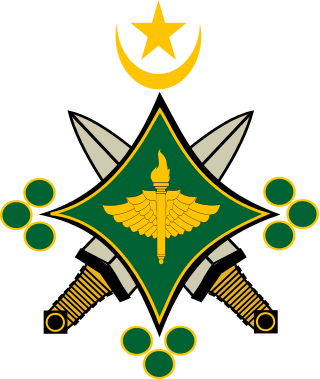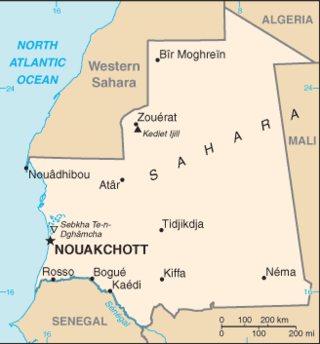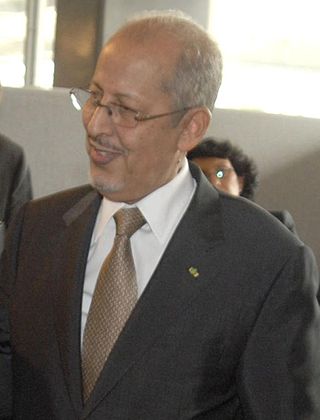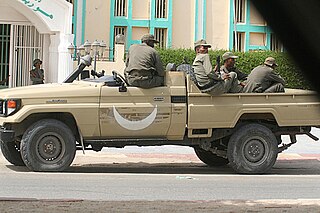The original inhabitants of Mauritania were the Bafour, presumably a Mande ethnic group, connected to the contemporary Arabized minor social group of Imraguen ("fishermen") on the Atlantic coast.

The Armed Forces of Mauritania is the defense force of the Islamic Republic of Mauritania, having an army, navy, air force, gendarmerie, and presidential guard. Other services include the national guard and national police, though they both are subordinated to the Ministry of the Interior. As of 2018, the Mauritanian armed forces budget was 3.9% of the country's GDP.

Mu'awiya Ould Sid'Ahmed al-Taya is a Mauritanian military officer and politician who served as the President of Mauritania from 1984 to 2005. He also served as the fifth Prime minister of Mauritania from 1981 to 1992 except for a brief period in 1984.

A military coup took place in Mauritania on 3 August 2005. President Maaouya Ould Sid'Ahmed Taya was ousted by the Armed Forces of Mauritania and replaced by the Military Council for Justice and Democracy (CMJD), headed by Ely Ould Mohamed Vall, while Taya was in Saudi Arabia attending the funeral of King Fahd of Saudi Arabia.

The Military Committee for National Salvation was a military Government of Mauritania that took power in the 1979 coup d'état. It was installed by Mohamed Khouna Ould Haidalla, Ahmed Ould Bouceif and fellow officers, in an internal regime/military coup on April 6, 1979, removing Colonel Mustafa Ould Salek of the Military Committee for National Recovery (CMRN) from effective power. He was officially replaced by Mohamed Mahmoud Ould Louly in June 1979. Haidalla would later emerge as the main military strongman and go on to assume full powers in the 1980 coup d'état, only to be deposed by Colonel Maaouya Ould Sid'Ahmed Taya in the December 1984 coup d'état.

Sidi Mohamed Ould Cheikh Abdallahi was a Mauritanian politician who was President of Mauritania from 2007 to 2008. He served in the government during the 1970s, and after a long period of absence from politics he won the March 2007 presidential election, taking office on 19 April 2007. He was deposed in a military coup d'état on 6 August 2008.

An Islamist insurgency is taking place in the Maghreb region of North Africa, followed on from the end of the Algerian Civil War in 2002. The Algerian militant group Salafist Group for Preaching and Combat (GSPC) allied itself with al-Qaeda to eventually become al-Qaeda in the Islamic Maghreb (AQIM). The Algerian and other Maghreb governments fighting the militants have worked with the United States and the United Kingdom since 2007, when Operation Enduring Freedom – Trans Sahara began.
In December 1984, Haidallah was deposed by Colonel Maaouya Ould Sid'Ahmed Taya, who, while retaining tight military control, relaxed the political climate. Ould Taya moderated Mauritania's previous pro-Algerian stance, and re-established ties with Morocco during the late 1980s. He deepened these ties during the late 1990s and early 2000s as part of Mauritania's drive to attract support from Western states and Western-aligned Arab states. Mauritania has not rescinded its recognition of Polisario's Western Saharan exile government and remains on good terms with Algeria. Its position on the Western Sahara conflict has been, since the 1980s, one of strict neutrality.

The 2008 Mauritanian coup d'état was a military coup that took place in Mauritania on August 6, 2008, when President Sidi Ould Cheikh Abdallahi was ousted from power by the Armed Forces of Mauritania, led by a group of high-ranking generals he had dismissed from office earlier that day.

Mohamed Ould Abdel Aziz is a retired Mauritanian military officer and politician who served as the 8th president of Mauritania from 2009 to 2019.
The following is a timeline of the history of the city of Nouakchott, Mauritania.

The 1984 Mauritanian coup d'état was a bloodless military coup in Mauritania which took place on 12 December 1984.

The 2003 Mauritanian coup d'état attempt was a violent military coup attempt in Mauritania which took place on 8–9 June 2003.

The 1978 Mauritanian coup d'état was a bloodless military coup in Mauritania which took place on 10 July 1978. The coup, led by the Army Chief of Staff, Colonel Mustafa Ould Salek, who commanded a group of junior officers, overthrew President Moktar Ould Daddah, who ruled the country since independence from France in 1960.
Events in the year 2021 in Mali.

The 1979 Mauritanian coup d'état was a military coup in Mauritania which took place on 6 April 1979. The coup was led by Colonel Ahmed Ould Bouceif and Colonel Mohamed Khouna Ould Haidalla, who seized power from the President, Colonel Mustafa Ould Salek, and the 20-member ruling Military Committee for National Recovery (CMRN), a military junta which was created following an earlier coup in 1978.







